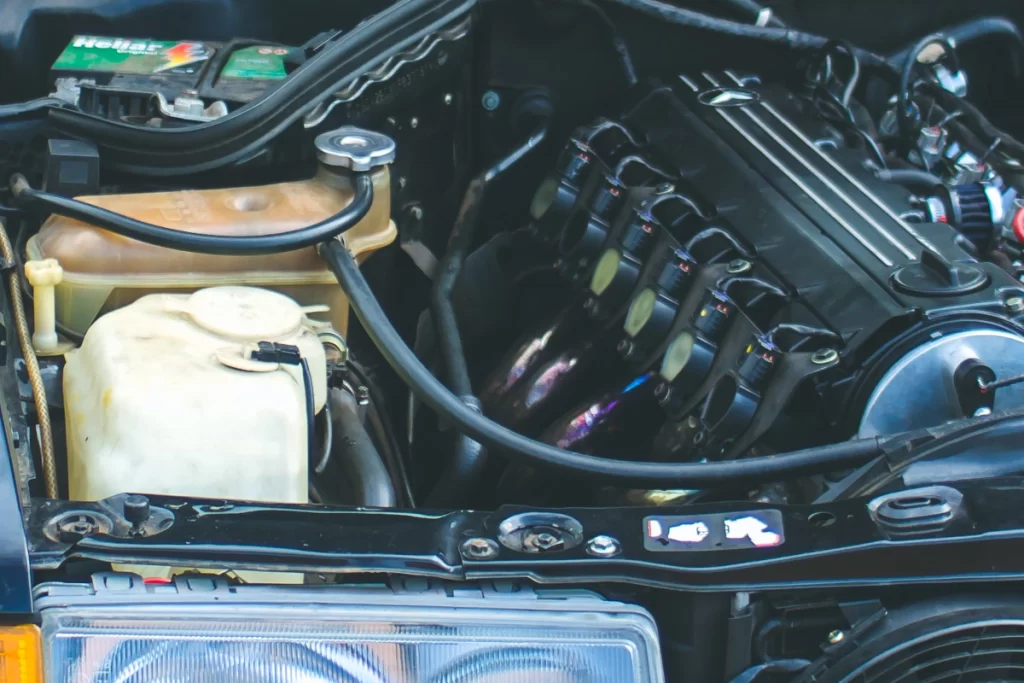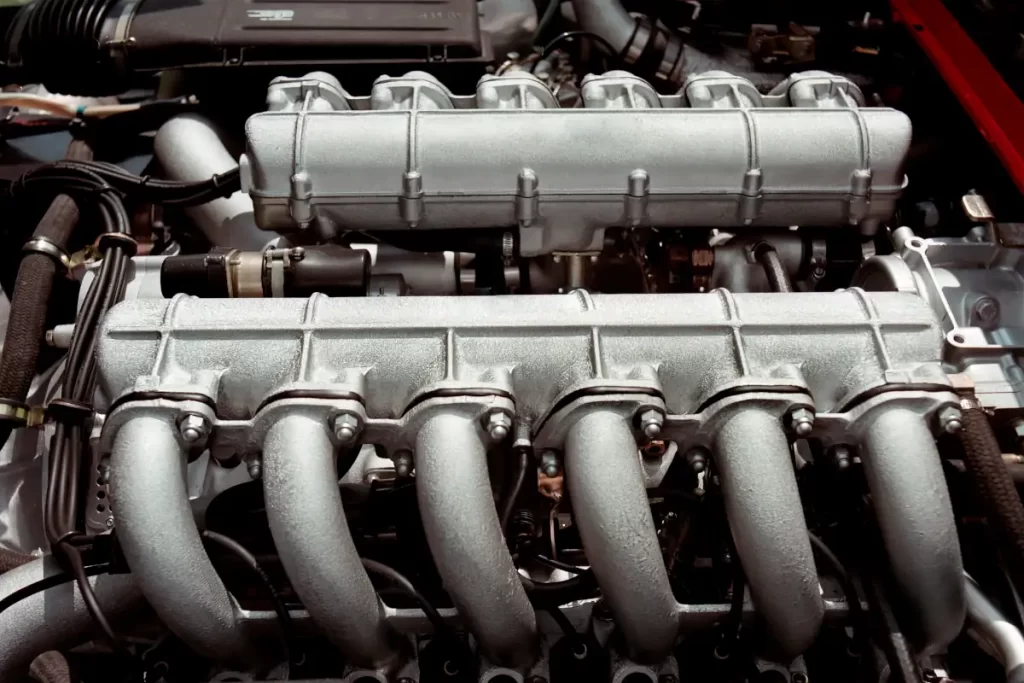The exhaust manifold is an important part of the car’s exhaust system and pulls fumes away from the engine.
Where is this system located? How does it impact the rest of the car’s exhaust system? What happens if the exhaust manifold breaks?
Keep reading to find out!
Here’s What An Exhaust Manifold Is Used For In A Car
The exhaust manifold collects the exhaust from the car’s engine and prevents it from entering the cabin. However, this device is also important to the outside environment and the car’s performance. A leaking exhaust manifold could cause serious damage and harm to yourself and others.
- Here's What An Exhaust Manifold Is Used For In A Car
- Are Exhaust Manifolds Necessary In A Car?
- Do Exhaust Manifolds Improve Car's Performance?
- Will an Exhaust Manifold Improve Car's Gas Mileage?
- Can A Badly Designed Exhaust Manifold Damage The Car Engine?
- Is A Leaking Car Exhaust Manifold Bad For The Car Engine?
- Conclusion
- Sources

The exhaust manifold is located right next to the engine. It’s attached to the engine block, the platform holding the engine and its components.
The exhaust manifold performs an important environmental service. This device collects the car’s dangerous fumes and prevents them from entering the air and car cabin. Without this device, the cabin could fill with dangerous fumes such as carbon monoxide.
The exhaust manifold pulls these dangerous fumes into the catalytic converter or turbocharger. Both of these mechanisms convert toxic fumes into less toxic gasses, which are then expelled from the car.
These devices are similar, and some cars actually have both. Essentially, both devices break down the chemical compositions of gasses. This laters the gas structure and turns them into less dangerous fumes, which are then expelled.
These parts work together and are important to the car’s exhaust system. Without them, it would be impossible for the exhaust to be expelled from the exhaust pipe and away from those inside the car.
The exhaust system collects the fumes created by the internal combustion engine. These fumes are then brought to the converter, which causes a chemical reaction. This changes the molecular structure of the gasses. These purified gasses are then pushed out of the vehicle through the exhaust pipe.
Related:
- 5 Reasons Why My Car Exhaust Manifold Is Smoking? (Solved)
- Are Car Exhaust Manifold Gaskets Reusable? (Explained For Beginners)
- What Are Car Exhaust Manifold Bolts Made Of? (Answered)
Are Exhaust Manifolds Necessary In A Car?

Exhaust manifolds are very important for the function and performance of vehicles. Exhaust manifolds help ensure fumes are purified, cooled, and properly expelled. Although the exhaust manifold is ineffective without the whole system functioning, the exhaust system can’t work without it either.
The exhaust manifold performs a variety of important tasks that prevent several unpleasant experiences.
Exhaust manifolds prevent the below:
- Bad smells
- Dangerous fumes
- Decrease environmental impact
- Loss of car acceleration
- Poor fuel economy
Without the exhaust manifold, your vehicle will struggle to perform properly. The car will have additional stress, which will drag it down and cause unnecessary wear on the car’s systems.
While old cars didn’t have these devices, they also lacked the clean air and cabin environments of modern vehicles. Exhaust manifolds first entered the car scene back in 1963. They were a welcomed addition since they prevented toxic fumes from entering the vehicle.
While many saw it as a luxury, it certainly isn’t. The gasses produced by the engine are dangerous to passengers and the environment. Manifolds eventually became mandatory throughout the 1970s and were increasingly popular as the years progressed.
The car’s various parts, such as the engine, will continue to function without the exhaust manifold. But this is not good for the car, your health, or the environment.
Do Exhaust Manifolds Improve Car’s Performance?
Exhaust manifolds are an important part of your car’s performance. They impact your car’s ability to accelerate and how much gas it consumes per mile. Exhaust manifolds improve the car’s overall performance and make it safer and less impactful on the environment.
Most cars utilize a traditional exhaust manifold. However, some performance vehicles utilize exhaust headers to improve their speed and vehicle performance further. This is achieved by minimizing the amount of pushback the exhaust manifold produces when it pushes the air through the catalytic converter.
However, even if you don’t have a specialized header, the exhaust manifold still helps enhance vehicle performance. This air movement is an important part of car performance, and too much airflow through an open system can slow the car down considerably.
Headers are generally unnecessary for a usual car. However, if you’re looking for a little boost, consider getting one. The exhaust manifold is essential to the car’s performance and will enhance the overall speed.
Will an Exhaust Manifold Improve Car’s Gas Mileage?
The exhaust manifold enhances the engine’s performance. This helps ensure the car doesn’t waste fuel and increases energy output. You can further enhance your vehicle’s performance by regularly maintaining your car’s exhaust system.
A dirty, disrupted, or poorly designed exhaust system can cause airflow disruption. The quicker gasses are removed, the sooner the car starts a new cycle. Disruptions can cause a lag in the cycle which causes excess fuel to be burned.
Factory or stock exhaust systems don’t have as good fuel economy as specialized systems. While having an exhaust manifold will improve fuel economy, enhancing the system will improve it further.
According to recent estimates, improving your car’s exhaust system can improve fuel economy by 3%. Over time this adds up to be significant fuel performance.
Can A Badly Designed Exhaust Manifold Damage The Car Engine?
A poorly designed exhaust manifold can significantly impact your car’s engine. Not only does the exhaust manifold impact the car’s performance, but its lifespan. This system pulls hot air away from the engine, preventing it from overheating and becoming weaker.
A damaged, weak, or poorly designed exhaust manifold can lead to your engine overheating. This can cause significant damage over a prolonged period of exposure.
Some signs of a damaged or poorly designed exhaust manifold to be aware of include the following:
- Bad smells entering the cabin
- Fumes entering through the heating and air conditioning vents
- Loud engine noises
- Difficulties accelerating
All of these can indicate that your exhaust manifold isn’t working. If you believe it’s a manufacturing malfunction, you should check with the provider regarding the warranty.
If you want to replace your exhaust manifold, you must first locate the system. When you open the hood, you should see the exhaust manifold on either side of the engine. It might be in different locations depending on the type of engine you have.
The exhaust manifold is usually slightly above the engine, off to the side in a V6 or V8 engine. A four-cylinder car may have this system under the engine or behind it.
Once you locate your system, remove the intake system. The intake system provides oxygen to the engine, thus encouraging combustion.
Once you have these systems separated, do the following steps:
- Remove exhaust manifold
- Remove exhaust pipe
- Remove any rotting gaskets (if necessary and you want to reuse the old manifold)
- Reconnect the repaired system
- Or, replace the old system with new
If you’re driving an older vehicle (over ten years), you might want to consider replacing the old exhaust system. Not only does the system become worn out over time, but new systems are usually more enhanced and better designed.
Is A Leaking Car Exhaust Manifold Bad For The Car Engine?
A leaking car exhaust manifold will damage your engine. The engine requires fresh air (oxygen) in order to perform correctly. Without fresh air, the combustion will fail, and the car will be unable to perform properly.
Your car most likely utilizes an internal combustion engine. The only vehicles which do not use this system are diesel and electric vehicles (EVs).
An internal combustion engine operates by pulling air into the engine and using it to burn the fuel. Without oxygen, this system will not be able to work properly.
In other words, your car is performing small explosions. These small explosions are ignited by spark plugs and pistons. These sparks heat the fuel, producing heat and energy. Without oxygen, this combustion is virtually impossible.
Conclusion
The exhaust manifold sounds like a simple and unimportant device of the car. The fact that these systems weren’t always present in cars seems to challenge their utility.
But they’re one of the most important parts of your car’s engine. The whole car can suffer if this system breaks down or functions poorly.
Try to keep this system clean and running smoothly! This will help keep you and the environment safe.
Sources
Wikipedia: Engine Block | Wikipedia: Turbocharger | Wikipedia: Automotive Systems/Intake System
My Car Dictionary: Exhaust manifold
Car Fax: What Is A Catalytic Converter?
Universal Technical Institute: WHAT IS A CATALYTIC CONVERTER AND WHAT DOES IT DO?
Wrench: What Is An Exhaust Manifold?
GRWA Performance: History of exhaust system
Auto: How Stuff Works: How do exhaust headers work to improve engine performance?
Get Jerry: Exhaust Manifold vs Header: What’s the Difference?
Scottsdale Muffler: How to improve gas mileage with a custom car exhaust
954 Mufflers: Improving fuel efficiency with a new exhaust system



